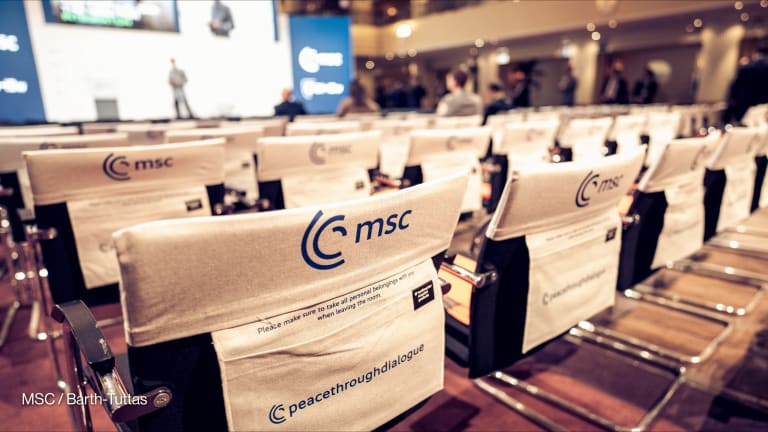
SYDNEY — The annual conference for the Australian Council for International Development took place in Sydney this week, gathering leaders from Australia’s NGO sector and beyond to explore issues crucial to the sector.
The theme of the two-day meeting was “Human Rights in the 21st Century,” which encouraged intense discussion on politically charged issues including climate change, geopolitics, and refugees on Nauru and Manus Island.
But it was also an opportunity for the sector to listen and learn from each other. Here are the key takeaways.
Annual general meeting announcements
Day one of the ACFID conference included the annual general meeting of members.
As expected, the proposed change in the ACFID Code of Conduct was passed unanimously, resulting in an amendment that will create a “clear-cut, high-level commitment for NGOs to advance the safeguarding of people vulnerable to sexual exploitation and abuse.”
Australia recommends code of conduct changes in response to #AidToo
ACFID has announced a high-level commitment for the prevention of sexual exploitation and abuse, to be agreed to by its 122 member organizations.
The general meeting also endorsed further changes, a resolution proposed by the International Women’s Development Agency was unanimously passed, requiring the sector to prioritize the needs of victims and survivors of sexual misconduct; adopt a transformative approach to prevention; and quickly implement recommendations from the soon-to-be-released independent review by the Victorian Institute of Forensic Medicine.
The #KidsOffNauru campaign, supported by ACFID and members including World Vision Australia, also received attention. Members passed a resolution that no one should be held indefinitely on Nauru — especially children — and an enduring solution needed to be found for everyone. The sector resolved to shine a light on the issue and draw the attention of the Australian public — and to advocate that political leaders remove children and families from Nauru by Universal Children’s Day on Nov. 20.
Politics of aid
Climate change, offshore detention, engagement in the Pacific, and a hypothetical embassy move to Jerusalem have all topped the foreign policy discussions in recent months, and the speeches of Liberal, Labor, and Green representatives were closely watched.
The assistant minister for international development and the Pacific, Anne Ruston, addressed the ACFID conference eight weeks into her new role. Applauding the council for its work and for being an independent, respected voice, Ruston reiterated the message of predecessor Concetta Fierravanti-Wells, and said that the aid program is not well understood by the Australian public and encouraged NGOs to work with the government to get messaging out on how it was of direct value to Australian communities.
While the first part of her speech was well received by the audience, the latter was not.
“Minister, with respect, get the kids off Nauru.”
— ACFID audience memberShe drew ire for her statements on Nauru — that the information shared by NGOs and the media was “not based in fact.” She said that refugee children on Nauru are not based in a regional processing center, but housed in accommodation with their families with “appropriate” health care, education, and other services.
“Minister, with respect, get the kids off Nauru,” was the response from a member of the audience.
Class action asks UN to deliver finding on separation of asylum seeker families in Australia
This case is expected to be followed by humanitarian groups globally to determine how it could impact other immigration policies.
Greens leader Richard Di Natale held nothing back, blasting the sitting government as “hypocrites,” as they avert their eyes from the refugees on Nauru and Manus Island in the continued push for sale of Australian manufactured arms to Saudi Arabia.
“It is not the choice a country upholding human rights make,” he said.
The address from Labor Senator Claire Moore focused on her personal thoughts on human rights and the inquiry into the Sustainable Development Goals she is heading. The inquiry aims to push Australia to look beyond the first voluntary national review, Moore said, with more groups wanting to be consulted and engaged — including people with disability.
She is also hopeful the thoughts of the next generation of voters will be included on the official parliamentary record — as the goals are for their future.
Soft power
The role of “soft power” is being discussed in an ongoing review conducted by the Department of Foreign Affairs and Trade. In a response to the review, ACFID highlighted the importance of NGOs, which utilize the “breadth and span” of their networks and relationships.
Denghua Zhang from the Australian National University’s Department of Pacific Affairs, discussed the dramatic shift taking place in China’s development program. Showing figures of Chinese aid spending between 1950-2012, Zhang explained that a quarter of all aid spending has occurred since 2010. Africa is the largest recipient, with more than half of the total aid spend, followed closely by Asia. With concessional loans are rapidly becoming the aid delivery method of choice.
Trilateral projects are also increasing, with China working with traditional donors such as Australia, New Zealand, and the United Nations Development Programme on projects in middle- and low-income countries.
NGOs that wish to influence China’s aid program, Zhang said, should focus on their partner countries — and not China. It is a role Amrita Malhi, development economics adviser at ACFID, said they would be further investigating to understand how NGOs can support soft power in the Indo-Pacific region.
Indigenous voices need to be supported
Joan Carling, an indigenous and environmental activist and recent recipient of the U.N. Champions of the Earth Award for lifetime achievement addressed the conference on indigenous rights and conflicts borne from natural resource management.
In her home country of the Philippines, there is an estimated indigenous population of 14-17 million people. More than half are located in Mindanao — an area rich in natural resources. Conflicts between locals, international mining companies, and military have become common. Carling said that activists are killed or labeled terrorists under national security laws to stop dissent.
The U.N. has stood by Carling and her co-accused, but she said more support is needed. SDGs should recognize indigenous populations and the challenges faced by them — including those faced by indigenous women, disproportionately affected through losses to environment as well as physical risks of violence outside their communities, she said.
Countries such as Australia, Carling said, should do more to halt mining companies that are adding to the violence and loss of traditional land as part of international operations.
While Indigenous Australian speakers were involved in the conference, they did not add to this conversation. With Indigenous partners playing an increasingly important role in Australia’s aid program, the conference next year may see this topic.
Highlighting health challenges of the Indo-Pacific region
Health programs create a major challenge both politically and in implementation.
Though just 160 kilometers from Australia’s mainland, Papua New Guinea’s health risks of child and infant mortality are among the world’s worst, said Olive Oa, PNG health program manager with ChildFund. For women living in the region, 1 in 120 women die in childbirth with an infant mortality rate of 42 out of every 1,000, according to the World Bank.
Lack of skilled birth attendants, under-equipped primary health care services, poor access to water and sanitation, and the long distance to quality care are among the challenges faced, and those NGOs and the government are attempting to address.
Alternative approaches are also being researched to give women greater choice. Kirsten Black, associate professor and academic gynecologist at the University of Sydney, presented a project funded by Rotary Australia that supports the education and use of contraceptive implants within a region of PNG. In educating women and men on the process, risks, and benefits of the implant, they saw a strong uptake in its use. This resulted in reduced birth rates, and the reduction of high-risk pregnancies and births as the time between pregnancies also increased.








